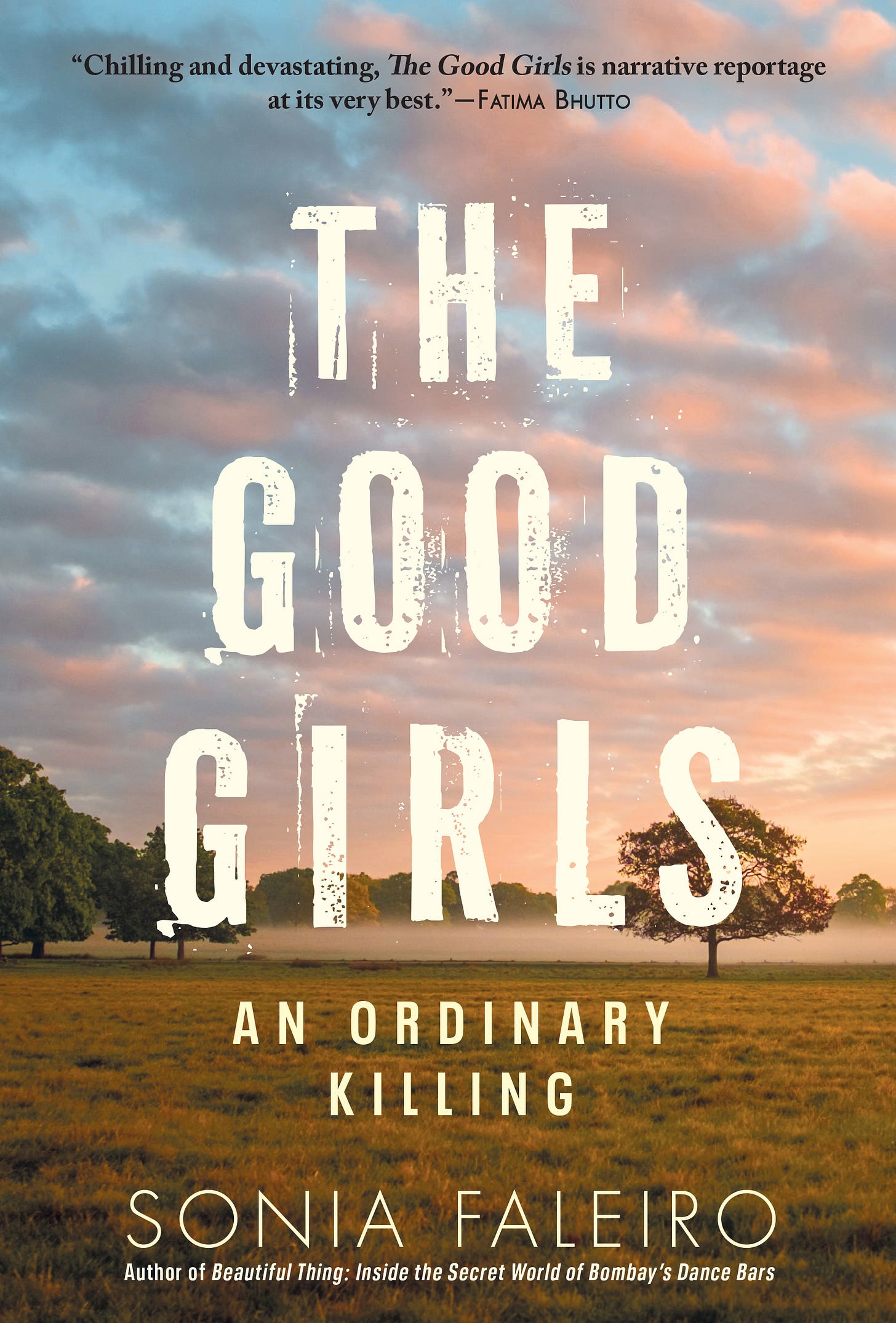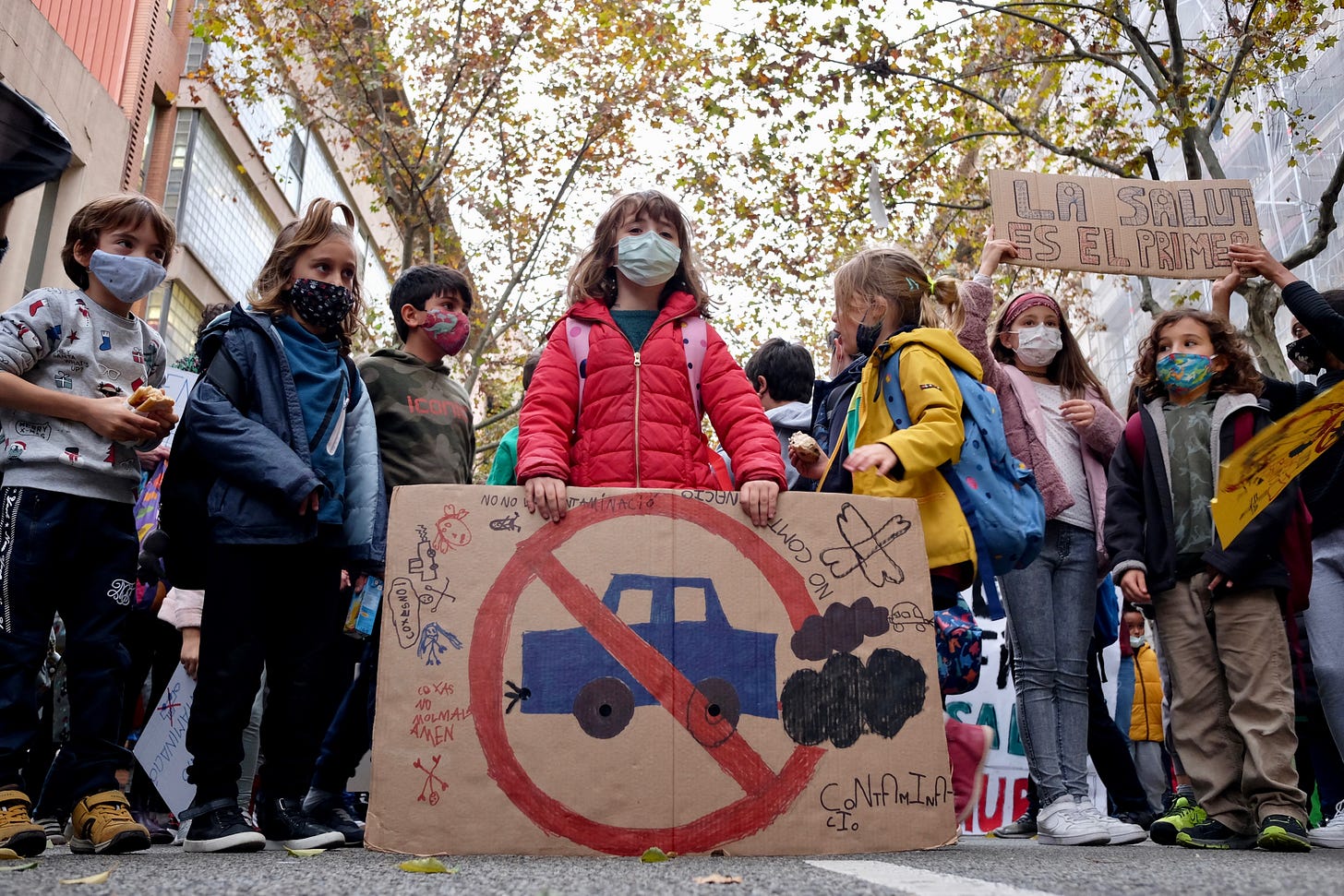2021: Here Are Some Good Things to Read
Welcome to Deca’s third newsletter: a quick summary of what our members are up to, a guide to things to read, and some resources for writers.
News:
Published last week, Sonia Faleiro’s new book The Good Girls: An Ordinary Killing (Grove Press) received not one, but two rave reviews in The New York Times. The Good Girls is a book of true crime that investigates the mysterious hanging deaths of two teenagers in a village in India. The girls, Padma and Lalli, were 16 and 14, when they were discovered in the mango orchard one morning in May 2014. You probably heard about the case—it made headlines all over the world.
The Good Girls is also a book about girlhood, what it means to be a young woman in modern India, and what “modern” means in India today. It is a book about all the things that determine life and death the world’s largest democracy: money, politics, gender, caste and the criminal justice system.
“The Good Girls is transfixing … Faleiro has a talent for ramifying plots and slippery characters — for a narrative that resists easy formulation. We glide swiftly, smoothly, only to realize that we’re not approaching a clearing but being led into a darker, more tangled story,” wrote Parul Sehgal in the Times daily edition.
Later in the week Nina Burleigh raved about the The Good Girls in the Book Review: “Gorgeous. This story is at heart a Southern Gothic — a Southern Hemisphere Gothic — a tale of stymied sexuality and buried secrets. A puzzle with a surprise at the end. A riveting, terrible tale, one all too common, but Faleiro’s gorgeous prose makes it bearable.”
Recently Faleiro spoke about her book to Scott Simon for NPR’s Weekend Edition. Take a listen here.
After that, the reviews kept coming:
Abhijit Banerjee, winner of the 2019 Nobel Prize in Economics: “The Good Girls left me shattered.” Megha Majumdar, author of A Burning: “An extraordinary book studded with insights into media, justice, corruption, and the rules governing women's lives. Padma and Lalli—harvesting mint, enchanted by a play, seeking freedom, wishing to be something—will stay powerfully with me.” Fatima Bhutto, author of The Runaways: “Chilling and devastating, The Good Girls is narrative reportage at its very best.” Barbara Demick, author of Eat the Buddha: “A compulsively readable whodunit, as fast-moving as a mystery novel that at a whole deeper level offers profound observations about caste and sexuality in rural India.” The Economist: “A sobering portrait of a country where progress has been undermined by inequality, short-termist politics and Mr Modi’s divisive Hindu nationalism. It is a powerful indictment of a society failing its most vulnerable members.” The Financial Times: “A gripping real life mystery taut with dramatic tension.” The Wall Street Journal: “The Good Girls is a riveting—sometimes astonishing—work of forensic journalism.” Kirkus: “A modern day Rashomon.”
If you’d like to read The Good Girls, you can get it here:
Congrats, Sonia!
Human Resources Department:
From “Exposed. Afraid. Determined,” a New York Times Magazine feature about front line workers facing Covid-19. (photo: Gustavo Diaz)
Here’s what Deca’s writers have been up to around the world:
Delphine Schrank is in Mexico City after returning from months reporting in Honduras. But it’s the recent coup across the world in Myanmar, her old beat, that have us turning to her 2015 book The Rebel of Rangoon: A Tale of Defiance and Deliverance in Burma (Bold Type Books). Named a Book of the Year by Kirkus, the book predicted this month’s coup and anticipated the emerging forces behind it, and introduced us to characters who would go on to become members of Parliament and senior public servants in the delicate civilian-military power sharing gamble that’s just unravelled. Many of the book’s characters have been detained now, or returned to hiding this month. Worth a look back.
Tom Zoellner is in Los Angeles. His most recent book, The National Road: Dispatches from a Changing America (Counterpoint, October 2020), received a rave in The New York Times Book Review, where Jody Rosen described it as a “sneakily ambitious,” and “a sweeping view of the American land and its inhabitants―how each has shaped, and deformed, the other.” NPR called the book “a fascinating investigation into American places and themes.” Zoellner’s other 2020 book — yes, really — is Island on Fire: The Revolt that Ended Slavery in the British Empire (Harvard University Press, 2020) and was named a National Book Critics Award finalist.
McKenzie Funk lives in Ashland, Oregon. His interview with Karen Raaf, a 28-year-old gas station attendant in Sisters, Orgeon, appeared in the New York Times Magazine last year. Funk’s new book about the life and legacy of the “father of data fusion,” Hank Asher, is forthcoming from St. Martin’s Press.
Rania Abouzeid is in Beirut, Lebanon. She most recently wrote for National Geographic about watching the U.S. Capitol insurrection from abroad, and reckoned with tragedy at home—the explosion at the Beirut city port that left more than two hundred people dead, 7,500 injuries, and $15 billion worth of property damage. Her latest book, Sisters of the War, was published by Scholastic in September 2020, and is a young-adult adaptation of her critically acclaimed 2018 book on the Syrian conflict: No Turning Back. Life, Loss, And Hope in Wartime Syria.
Elizabeth Dickinson is in Bogota, Colombia, where she is a Senior Analyst with the International Crisis Group. She has most recently written about one social activist’s fight to protect herself against the criminals whose rackets she disrupts, and the murders of Colombian grassroots’ activists.
Mara Hvistendahl lives in Amsterdam, Netherlands, where she’s an investigative reporter with The Intercept. Her recent stories include covering the U.S. capitol insurrection and delving into China’s man in Washington. Meanwhile, for Wired, she discovered how a Chinese AI giant made chatting—and surveillance—easy. Mara’s second book, The Scientist and the Spy (Penguin Riverhead, 2020) just came out in paperback.
Richard Poplak is in Johannesburg, South Africa where he writes for The Daily Maverick. His latest pieces include this one on how the United States and South Africa bungled their response to the coronavirus, as well as this assessment of Cyril Ramaphosa, “smiling enabler of African autocracy.” He’s also working on a new book, Terrorform: The City After 9/11.
Vanessa Gezari is in New York where she works as the National Security Editor at The Intercept. Read her story about the Iran cables here.
Stephan Faris is in Brussels where he works for Politico, Europe. He is enterprise editor, responsible for special projects, the front-page of the weekly newspaper, and the Forum and Opinion sections online and in print.
Marc Herman is in Barcelona, Spain, where he teaches journalism at Catalunya International University, and recently wrote about a local effort to kill the car. He’s writing a new book, One in a Million, about immigration and technology.
Elementary school students block a Barcelona street.
Bookshelf:
Tom Zoellner recommends Kerri Arsenault’s Mill Town, a look at the uncertain fate of a factory town in Maine.
Subduction, a novel by Kristen Millares Young set in the Pacific Northwest, led McKenzie Funk’s list of recommendations. For (unfortunately) timely non-fiction, he suggests Seyward Darby’s Sisters in Hate, a look at the women in white nationalist movements.
Mara Hvistendahl also recommends a novel, C. Pam Zhang’s How Much of These Hills Is Gold. It’s a western.
Rich Poplak recommends Andrew Harding’s “sublime book on the farm murder phenomenon in South Africa,” These Are Not Gentle People.
“Somehow between the politics and the pandemic,” Stephan Faris found time to read Jenny Erpenbeck’s novel of migration politics in Europe, Go, Went, Gone, and highly recommends you do too.
If you read Spanish, or can fake it, Marc Herman suggests “The Southern Border,” a multimedia investigation of Mexico’s border produced by Spain’s El Pais and El Salvador’s El Faro. He learned a lot from Xiaowei Wang’s Blockchain Chicken Farm and Other Stories of Tech in China’s Countryside, and subscribed to new magazine The Drift after reading their brutal takedown of iffy diplomat Samantha Power.
Sonia urges you to follow Article 14 for the latest developments on the Indian government’s clampdown on freedom of speech. You can read her profile of an Indian comic arrested for a joke he didn’t make, in TIME.
Jobs, Grants, and Other Stuff Writers and Readers Will Find Intriguing:
The Intercept is looking for a Story Editor. Award-winning corruption-busting site AmaBhungane is looking for a senior investigative journalist. The Pulitzer Center is accepting proposals for its Global Reporting Grants (as long as they can be completed in the near term without much travel, thanks Covid!) The Atlantic is looking for a copy editor. The Washington Post is bolstering its tech team with eight new positions. And The WSJ is looking to expand coverage of the Middle East. Good idea, WSJ.
Stuck inside? Deca’s website, www.decastories.com, is full of stuff to read.
That’s it for now. Thanks.






